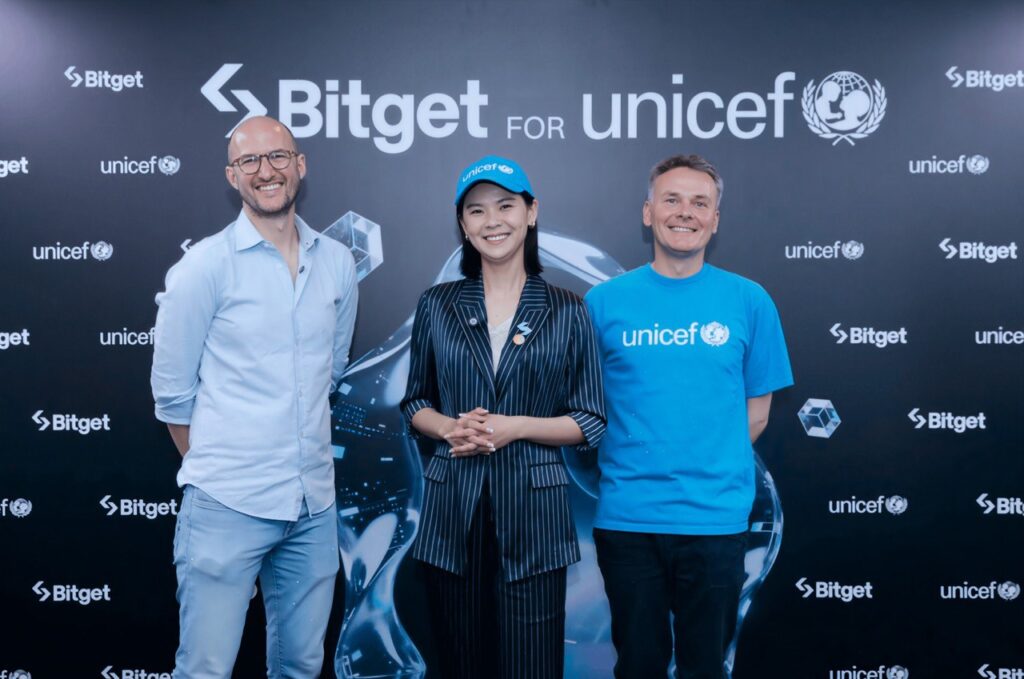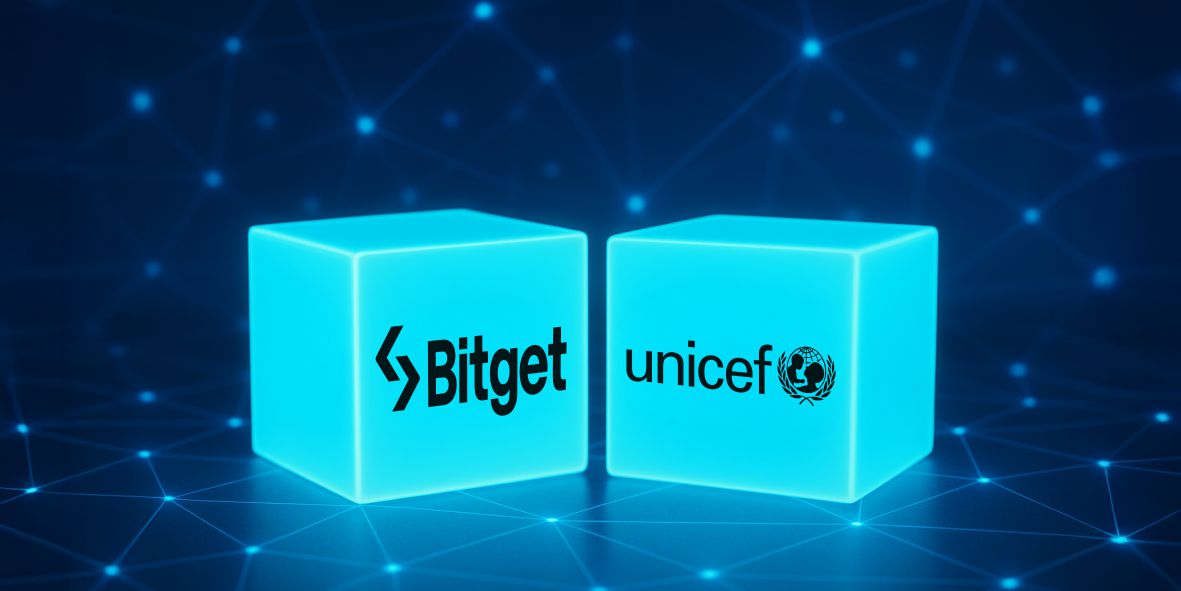Key Takeaways:
- Blockchain4Her will train 300,000 youths—mostly girls—in Web3 skills across eight countries.
- The programme teaches blockchain through creative tools, such as video game development.
- The initiative builds on UNICEF’s long-term investment in blockchain via multiple innovation funds.
Cryptocurrency exchange Bitget and UNICEF Luxembourg have launched Blockchain4Her, a three-year initiative aimed at closing the gender gap in digital education by providing blockchain and digital literacy training to 300,000 young people, primarily girls, in low- and middle-income countries, starting in 2025.
The partnership, announced during an event in Dubai, brings Bitget into UNICEF’s Game Changers Coalition (GCC), and will debut in eight countries: Armenia, Brazil, Cambodia, India, Kazakhstan, Malaysia, Morocco, and South Africa. A ninth country may be added as the programme expands.
Expanding Digital Curricula with Blockchain Skills
As part of the partnership, Bitget Academy will help develop UNICEF’s first blockchain training module, designed for both online and in-person learning.
The module focuses on using video game creation as a skill-building tool, empowering both teachers and students to engage with blockchain concepts through hands-on digital creativity.
The new module will be integrated into an existing curriculum that already reaches hundreds of thousands of learners
Building a More Equitable Web3 Future, One Learner at a Time
“Digital skills are a powerful driver of opportunity and inclusion,” said Sandra Visscher, Executive Director of UNICEF Luxembourg. “Innovation should be a force for inclusion, opening doors, broadening horizons, and ensuring that technology works for everyone, everywhere,” she added, highlighting the need to extend digital opportunities to every child, regardless of geography or gender.
Bitget CEO Gracy Chen described blockchain as “one of the most powerful tools we can give the younger generation to build products that change the way we look at modern society”, emphasizing the initiative’s role in equipping young women with the skills and confidence needed to shape the future of technology on their own terms.

On-the-Ground Insights from Dubai
During the post-announcement Q&A, conference attendees raised practical concerns, seeking clear insight into how the initiative would be implemented. Their questions focused on key themes, such as accessibility, online safety, gender equality in tech, and the long-term sustainability of Blockchain4Her.
How will the programme reach girls in remote and underserved communities?
UNICEF explained that their teams already work in local contexts and have longstanding relationships with schools and NGOs. Depending on the country, the programme will either embed modules directly into national school systems or use after-school hubs and youth centers for offline learning.
According to Gracy Chen, CEO of Bitget, the crypto exchange will provide tech and content support to complement UNICEF’s on-the-ground presence, as their goal is “not just broad access, but deep, lasting impact”.
What child-safety safeguards will be in place, especially with online and mentor-led formats?
According to UNICEF, the initiative follows its Responsible Innovation & Technology for Children framework, which ensures that every learning environment, physical or digital, prioritizes child protection.
Mentors are professionally trained, and no one-on-one communication is allowed without supervision. Digital literacy sessions will also include modules on online safety, data privacy, and responsible digital behavior.
How will Blockchain4Her address the gender bias already experienced by women in tech?
One attendee from the Web3 industry noted that women in tech are often assumed to be assistants, not founders. Bitget CEO acknowledged this and said that Blockchain4Her will actively elevate women founders, engineers, and coders as public role models.
She also shared that during panel discussions, she intentionally redirects stereotypical questions like “how do you manage work-life balance?” to male peers to challenge gendered assumptions.
The programme is also building peer networks to foster a sense of belonging and confidence for young women entering tech.
What will success look like after five years?
Chen said that their vision is both measurable and cultural: “We want to see more scholarships, more graduates, more women founding startups. But we also want a world where it’s no longer remarkable to see a woman leading in blockchain.”
UNICEF echoed this by noting that while they’re targeting 300,000 learners in the first year, they will scale the programme based on real-time feedback and evolving community needs.
How will Blockchain4Her ensure this is not just a one-time campaign, but something that creates lasting change?
Bitget CEO emphasized that sustainability is built into the initiative’s structure. In each pilot country, local teams will hold regular events, including hackathons, mentorship forums, and community-led workshops, to support graduates and drive continued engagement. “The goal is to build an ecosystem, not just deliver a course.”
Are there plans to bring the programme to the Middle East?
The Middle East isn’t on the initial Blockchain4Her map, but Bitget’s presence in the region, backed by a UAE license, keeps the door open, Chen said. She clarified that while there are no immediate plans for expansion, the company is ready to act if UNICEF identifies a need and the foundational infrastructure is in place.
UNICEF’s Early Bet on Blockchain: A Long-Term Commitment to Innovation
UNICEF’s journey into frontier technologies began with the launch of its Venture Fund in 2014, aimed at backing open-source tech solutions that address challenges faced by children in emerging economies.
The fund began investing in its first cohort in 2016, offering $50,000 to $100,000 in early-stage investments, and up to $400,000 at the growth stage.
In parallel, UNICEF launched its Innovation Fund in 2016 to support early-stage, open-source projects, particularly those using emerging technologies such as blockchain, AI, and sensors, with a focus on real-time data, youth engagement, and infrastructure for connectivity and access.
By 2019, UNICEF deepened its investment in blockchain technologies with the creation of its Cryptocurrency Fund, becoming the first UN agency to accept and distribute donations in Bitcoin and Ether. The fund enables direct, transparent support for startups, using blockchain for social good, removing currency conversion barriers and speeding up impact delivery.
Together, these funds represent a long-term, strategic commitment to using emerging technologies, not just to innovate, but to create scalable, equitable solutions that serve the most vulnerable communities worldwide.
Read more: Market Digest: Risk-On Sentiment Defies War, Stocks Surge Gold Dip



